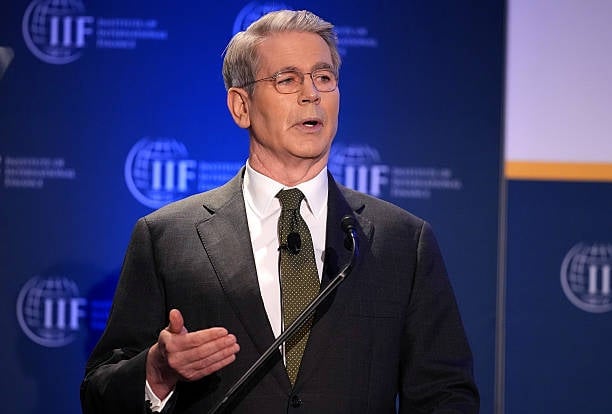'China needs to change,' Treasury Secretary Scott Bessent says
Bessent also called for major reforms to the IMF and the World Bank, accusing them of "mission creep"

Treasury Secretary Scott Bessent said Wednesday that China’s current economic model — built on “exporting its way out of economic troubles” — is unsustainable, and that the U.S. wants to help it change.
Suggested Reading
In his keynote address at the Institute of International Finance in Washington, D.C., Bessent urged China to move away from “export-led manufacturing growth,” which he said is harming both China and the entire world.
Related Content
“China needs to change,” Bessent said. “The country knows it needs to change. Everyone knows it needs to change. And we want to help it change — because we need rebalancing too.”
Bessent also called for major reforms to the International Monetary Fund and the World Bank, saying that mission creep has knocked these institutions off course.
“The IMF was once unwavering in its mission of promoting global monetary cooperation and financial stability. Now it devotes disproportionate time and resources to work on climate change, gender, and social issues,” he said.
He continued: “The IMF and World Bank serve critical roles in the international system. And the Trump administration is eager to work with them — so long as they can stay true to their missions.”
Bessent’s speech came a day after the IMF downgraded its outlook for growth globally and in the United States, citing President Trump’s tariffs, the highest in 100 years, as a major downward driver. On Tuesday, however, Trump said his China tariffs, currently at 145%, are too high and will come down substantially.
Speaking to reporters following his remarks, Bessent, a champion of tariffs, said Trump is not considering unilaterally lowering the tariffs imposed on China ahead of any negotiations with Xi Jinping, China’s leader. However, he added, “I don’t think either side believes that the current tariff levels are sustainable.”
“This is the equivalent of an embargo and a break between the two countries on trade does not suit anyone’s interest,” Bessent told reporters.
The Treasury Secretary said in his speech that more than 100 countries have approached the United States seeking to renegotiate trade, and the White House is “engaged in meaningful discussions and look forward to talking with others.”
But he reserved the bulk of his remarks on trade for China, which he said is currently tilting further away from consumption toward manufacturing. “China’s economic system, with growth driven by manufacturing exports, will continue to create even more serious imbalances with its trading partners if the status quo is allowed to continue,” he said.
Bessent was also critical of what he characterized as “the persistent over-reliance on the United States for demand” resulting in an unbalanced global economy.
As for the the IMF and World Bank, Bessent emphasized that the Trump administration is “committed to maintaining and expanding U.S. economic leadership in the world. This is especially true at the international financial institutions.”
The Trump administration has taken sharply different positions from other nations in the two financial institutions on climate change, international development, and economic imbalances. Bessent said the U.S. plans to use its leverage at the IMF and World Bank to push for key reforms.
“The United States will also demand that the management and staff of these institutions be accountable for demonstrating real progress,” he said.